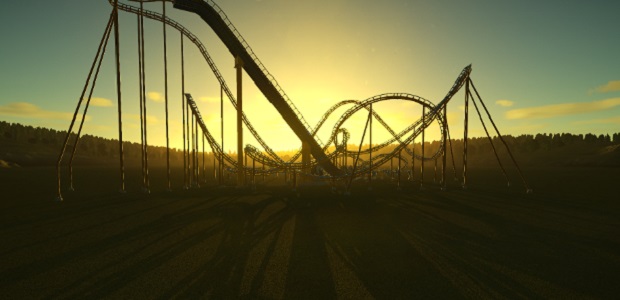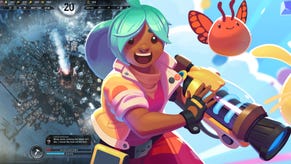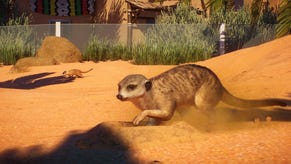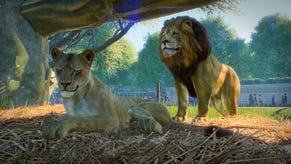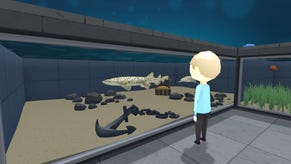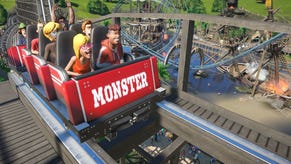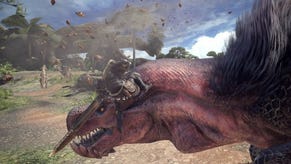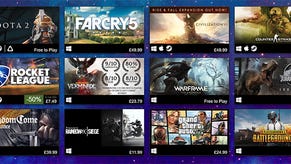Wot I Think: Planet Coaster
Planet Coaster
During tumultuous times, there’s comfort to be found in games that peddle nostalgia or task you with making people happy and keeping them entertained. Frontier’s theme park management game, Planet Coaster [official site], does both, letting you create theme parks where the worst thing that can happen is lots of people vomiting.
It is also a game that inspired me to spend an entire hour constructing a toilet, which inexplicably left me very satisfied.
My first park had to be Western themed. “Wouldn’t it be fun to make Westworld,” I thought to myself, entirely missing the point of the show. I found the perfect map, an empty American desert, but quickly hit my first obstacle: there aren’t many prefabricated buildings, and they’re mostly themed around pirates and medieval fantasy. The tools to expand this slight roster, however, are substantial.
Planet Coaster goes one level deeper than a lot of management games. You aren’t simply placing buildings in a park, you’re designing them as well. Every facility is essentially just a small cube with a little gap in the middle for vendors to ply their wares, and then the building housing the service, whether it’s a toilet or a burger stand, is constructed around it. Once the structure itself is finished, props can be added to give it character or match it to a theme.
What was once an unassuming little cube can become a spaceship bristling with alien weaponry or a medieval tavern, and quickly too. Walls neatly snap into place and can be moved up or down without any fuss, objects are easy to find using filters and a search bar, and the editor doesn’t have any problems with letting you merge objects or plonk them down at weird angles like you’re trying to create a non-euclidean theme park. It’s rare to come up against the limits and find that a tool won't do what you want it to, unless what you want to do is change an object’s size. A few times I’ve discovered the cherry to go atop one of my buildings, only to discover it’s far too small, or much too large. It’s one of the few limitations in what is otherwise a rich toybox.
You can even craft little scenes to entertain guests, which is something I’ve probably spent more time on than making roller coasters. Thanks to animatronics, entertainers and special effects, you can put together gunfights with explosions and a timed light show, or add some life to a sci-fi park by creating a spaceship hangar, complete with working robots doing maintenance and robotic arms waiting to remove cargo.
Rides aren’t quite as customisable as buildings, but a colour change and some props placed around them makes a surprising difference, and few of them can’t be tweaked to match a theme. A spinning octopus monstrosity can easily be presented as an alien ride, while the little planes in another ride can be made to look like gulls, making it fit with a pirate theme. Each of them plays music, and you can upload your own if you think your family-friendly fantasy princess theme park needs a little Slayer.
Creations can be saved as a blueprint, so you can use them again, but this also lets you share them with the community by uploading to the Steam Workshop. If you download a building, you can place it in your park as is, or you can tweak it as much as you want, keeping the parts that you like. And entire sections of your park can be copied and moved elsewhere, making the huge endeavour of relocating buildings and shops and a monorail something that only takes a couple of clicks.
All of this contributes toward Planet Coaster’s easy-going attitude: it rarely punishes and is always encouraging experimentation. Sure, you’re trying to make a successful park and bring in lots of cash, but that never gets in the way of messing around. At all times, the game remains playful.
You’re no doubt waiting for me to get to the main event: roller coasters. I will acquiesce. Planet Coaster’s got everything from quaint minecart coasters to vomit-inducing thrill rides, and while there are a handful of pre-made coasters available, many of the styles are exclusively for custom coasters. Building them is simple enough and pleasantly tactile, as you drag and pull on bits of track, molding each section. To work up to big drops, there are lift sections, as well as bits of track that slow carts down. For complex rides, you can even get two sets of carts going at the same time. A simple but effective set of terraforming tools means you can have tracks that speed through mountain tunnels, over valleys and off cliffs, and it’s possible to make genuinely striking locations in a matter of minutes.
I found myself hypnotised by the process of carving out the perfect spot and then toiling over my metal behemoth, but the spell was broken when I reached the testing phase. It didn’t work, and I didn’t know why. The test provided plenty of information when it came to how exciting or scary my ride was, broken down by each section of track, and even things like speed and G-force, but none of that mattered if the cart couldn’t get around the first curve. Did the cart need to go faster? Was the curve too sharp? I only had my eyes to go on.
This is a problem that exists throughout the game. Planet Coaster provides lots of information on everything from how much money teenagers spend on hats to how well-trained my janitor is, but when there’s something wrong with a ride, it’s surprisingly coy. It’s very easy to edit any aspect of the park, including roller coasters, but when the root cause of a significant problem isn’t clear, a lot of time can be wasted on trial and error tests.
It’s an oversight that’s perhaps even more noticeable because of the vast amount of details the game offers up elsewhere. The Park Management tab is overflowing with facts, from detailed expenses and income breakdowns to staff work routes, but the most important part can be found in the guest menu. Planet Coaster is all about demographics.
Guests are split up into three groups: adults, teens and families. Each group favours different rides and has different spending habits, and one group might be more dominant than the others. So if teens make up most of your visitors, you might consider adding more thrill rides to keep them happy, or diversify, chucking in some spinning teacups to get more families spending money. Families also seem to spend more in the gift shop, so it makes sense to build one near the family rides. The breadth of information makes it much easier to create plans.
Like theme park owners everywhere, in Planet Coaster you have the ability to peer into the minds of your guests, stealing their thoughts so that you might make an even better and more profitable business. If there’s too much vomit on the paths, or the line to the burger stand is too long, they’ll let you know. Sometimes, they’ll have extra context, making the issue clearer. For instance, instead of just thinking the park is too expensive, they might think that a specific ride is too expensive when they’ve already had to pay a lot to get into the park.
The Sandbox and Challenge modes are where Planet Coaster gets to show off its best features. They both give you a massive, empty plot of land, a blank slate, and then you're free to experiment and expand. The only difference between the modes is that in Sandbox you have unlimited money and every ride unlocked from the start, while Challenge adds the extra, and important, wrinkle of balancing budgets and keeping guests happy. They're both creative modes though.
Then there’s Career mode, which is a little bit rubbish. At first, I thought it was what Challenge mode turned out to be, given the name, but instead it’s a short series of scenarios that are dreadfully dull. You’re given a small, pre-built park, three objectives, and that’s pretty much it. The objectives are inane tasks, like earn a certain amount of money, or build an exciting roller coaster, and when you do them, you get stars. Well done. The parks are actually really impressive, visually, hinting at some of the ambitious projects you might want to undertake in your own park, and that’s probably the only reason you might want to check them out. Briefly. In beta, there have only been four scenarios, but the launch version promises many more. I can only hope the best is being saved for last.
I’m not sure I’d spend much time on scenarios even if they were better though. The draw of making my own park, choosing the theme and props myself, is much too strong. And Planet Coaster absolutely nails the more creative modes. The freedom and flexibility of its tools is simultaneously intimidating and exciting, just like the best roller coasters. It’s a game that inspires creativity, and Frontier have already started leveraging the most creative members of its alpha and beta community. In the Steam Workshop, there are already over 10,000 entries, including a Millennium Falcon and Hogwarts, which is probably more than any park needs.
Like Cities: Skylines, Planet Coaster gives new life to the management genre, and even if the launch version does little to improve what I’ve played during the beta, this would still be essential for anyone who dreams of packing in their old job and running a theme park.
This review was based on near-complete pre-release code. We'll update with any necessary thoughts based on today's 1.0 release. Planet Coaster is available now, for Windows, via Steam.


